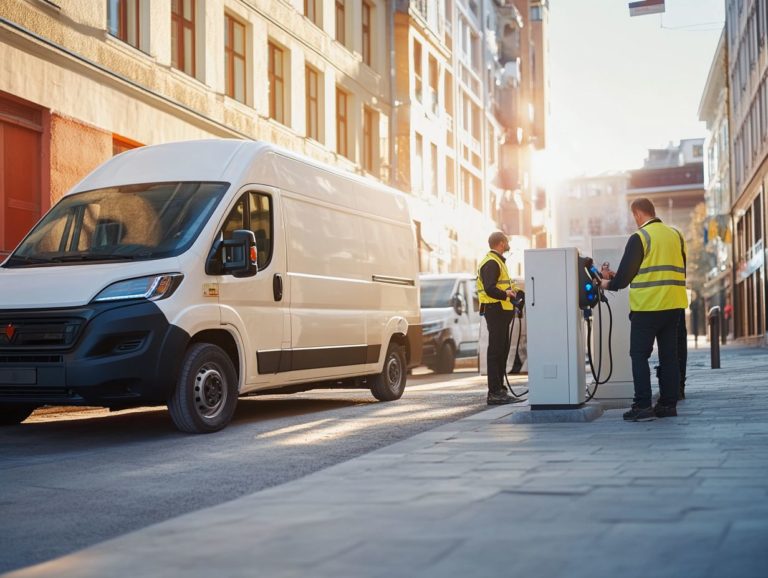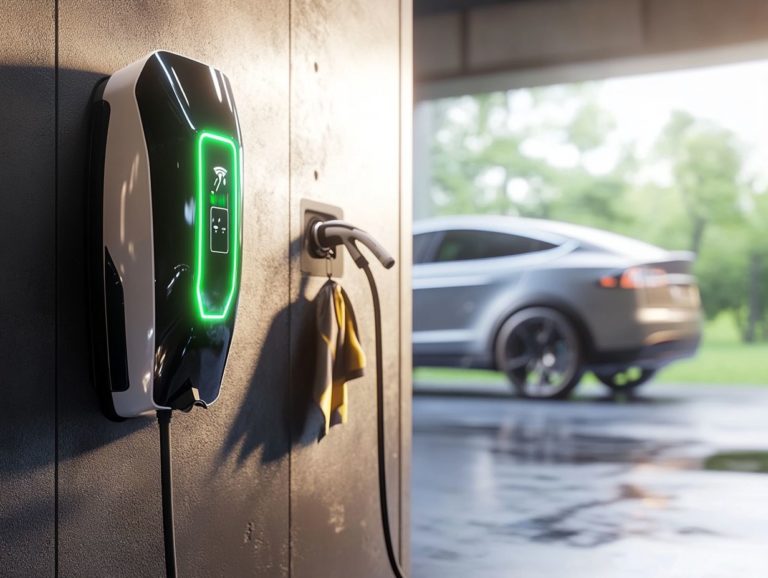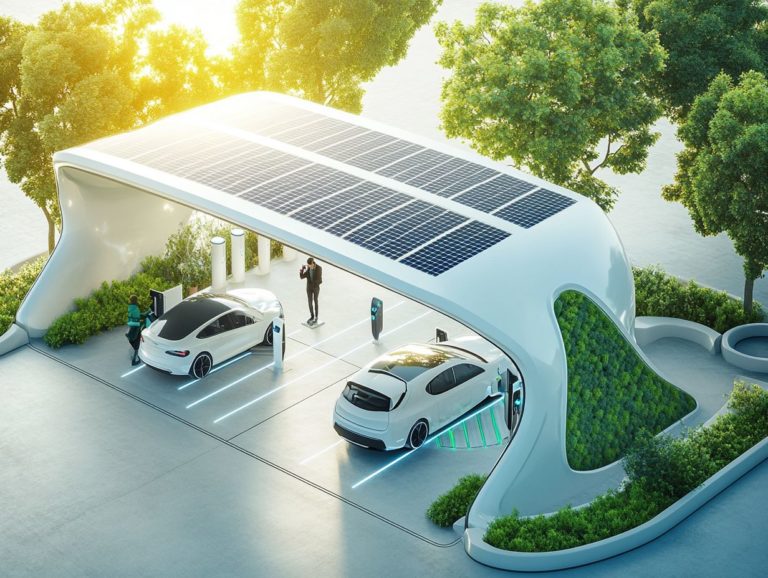The Impact of EV Charging on Home Energy Use
Electric vehicles (EVs) are changing how we think about transportation and energy use at home.
As more households adopt EVs, understanding their impact on home energy becomes essential. This article explores how EV charging affects energy consumption, highlights potential cost savings, and reviews different charging methods.
You ll discover practical tips for managing your energy effectively while considering future power grids and renewable energy options.
Whether you own an EV or are simply curious, this guide will show you how to optimize your home energy use while embracing this exciting technology.
Contents
Key Takeaways:
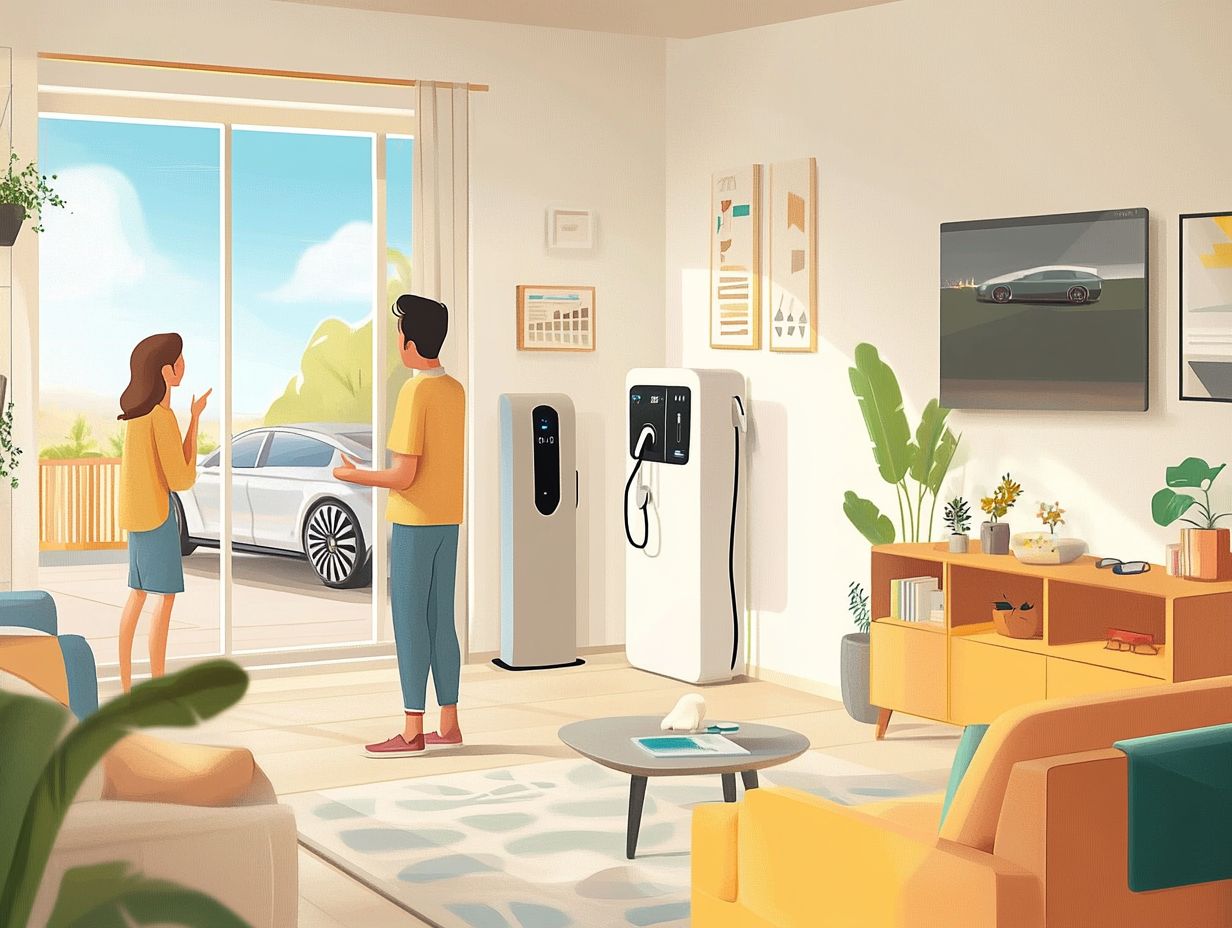
- Charging your EV at home may boost your energy use, but it opens the door to savings with smart strategies!
- The type of charging station and usage patterns can greatly influence your home s energy needs.
- Smart charging techniques can help you manage your energy while enjoying the benefits of EV ownership.
Overview of Electric Vehicles and Charging Methods
Electric vehicles (EVs) are a game-changer in transportation, marking a shift towards sustainable mobility.
As consumer interest grows, especially among middle-aged men, many are drawn to battery electric vehicles (BEVs) like the Tesla Model 3 and plug-in hybrids (PHEVs).
Developing charging options is crucial in this transition, influencing energy consumption and demand on the electric grid.
How EV Charging Affects Home Energy Use
Bringing electric vehicles into your home can significantly affect your energy use, shifting consumption patterns that impact your overall demand and bills.
With home charging stations, you can manage your charging practices to enhance efficiency and balance speed with cost.
Increased Energy Consumption
As more people adopt electric vehicles, you may see increased energy consumption at home. This shift can place additional strain on the electric grid, especially during peak times.
As EV popularity rises, watch for a potential increase in your energy bills due to heightened electricity needs. On average, an EV consumes about 30 kWh per 100 miles, which can lead to substantial energy use, particularly for larger households.
This trend challenges the electric grid’s capacity to keep up with demand, emphasizing the need for infrastructure upgrades. Innovative energy efficiency solutions like smart charging technologies and time-of-use tariffs can help you manage energy consumption, reducing the financial burden on your household while ensuring grid reliability.
Potential Cost Savings
Investing in electric vehicles and the right charging setup can lead to significant savings on energy bills and improved efficiency.
Using solar panels to charge your electric vehicle can enhance these savings by utilizing renewable sources.
This approach not only cuts your fuel costs compared to traditional gasoline cars but also supports a sustainable lifestyle. Imagine powering your vehicle with sunlight, which is often much cheaper than regular energy sources!
By integrating solar panels with your home charging station, you could potentially offset your electricity costs entirely, paving the way for long-term savings. In the end, this combination of electric vehicles and solar power is an attractive choice for eco-conscious homeowners.
Factors that Influence EV Charging and Home Energy Use
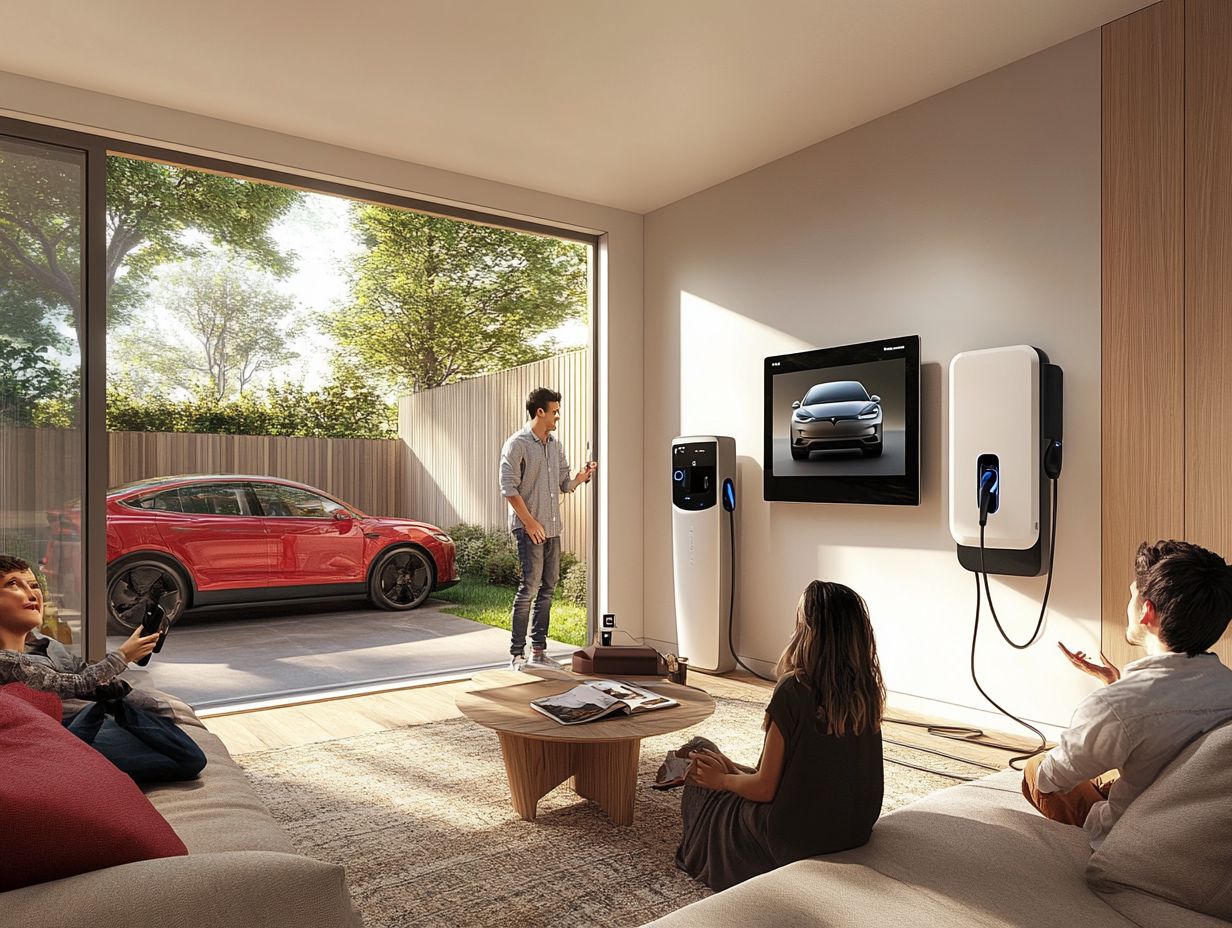
Several factors shape the relationship between electric vehicle charging and home energy use. These include the types of EV charging stations available, the existing setup, and how your energy consumption aligns with electricity prices that change based on the time of day.
By grasping these elements, you can boost your home’s energy efficiency and enjoy the perks of owning an electric vehicle!
Types of EV Charging Stations
- Level 1 charging
- Level 2 charging
- DC fast charging
There are three primary types of EV charging stations, each with its unique charging speeds and compatibility tailored to various electric vehicles, including battery electric vehicles (BEVs) and plug-in hybrid electric vehicles (PHEVs).
Level 1 charging makes use of a standard household outlet, making it the most accessible option but also the slowest. It s perfect for overnight charging, allowing you to wake up to a fully powered vehicle.
Conversely, Level 2 chargers, often found in homes or public locations, offer a significant boost in speed. They re ideal for daily drivers who may need a quick top-off during the day.
For those embarking on long-distance journeys, DC fast charging stations are the answer. They provide rapid power, catering specifically to individuals who frequently travel. When selecting the right home charger, consider your daily driving distance and personal habits. This thoughtful consideration ensures that your charging solution aligns seamlessly with your lifestyle, optimizing both convenience and efficiency.
Time of Use Rates
Time-of-use rates can significantly influence your costs when charging electric vehicles, as they set the electricity price based on the time of day and the overall demand on the electric grid. By strategically planning your charging times, you can optimize energy consumption and enjoy lower energy bills.
Understanding this pricing structure enables you to charge your vehicle during off-peak hours, when electricity costs are considerably lower, thus maximizing your savings. For example, charging late at night or during the early morning hours typically offers the best rates.
Integrating smart thermostats can improve your energy management. By adjusting your heating or cooling systems during these optimal charging times, you can minimize energy consumption and help alleviate strain on the grid during peak demand periods.
This comprehensive approach not only leads to substantial savings but also fosters a more sustainable energy consumption pattern, benefiting both your wallet and the environment.
Tips for Managing Home Energy Use with EV Charging
Effectively managing your home energy use while charging electric vehicles is essential for optimizing energy efficiency, particularly as demand for EVs escalates.
By embracing efficient charging methods and integrating smart home technology, you can significantly reduce energy consumption and enhance your household s overall energy management.
Efficient Charging Methods
Implementing efficient charging methods is paramount for you as an electric vehicle owner to optimize energy efficiency and reduce electricity costs. When choosing a home charger, consider both its charging speed and compatibility with your specific vehicle model.
Electric vehicles offer a variety of charging options, with Level 1 and Level 2 chargers being the most common for home use. Level 1 charging, which utilizes a standard household outlet, is perfect for overnight charging. On the other hand, Level 2 chargers provide a faster solution, dramatically cutting down on charging time.
To maximize efficiency, it s crucial for you to understand how to calculate energy consumption based on the output of these chargers and your vehicle’s specific requirements. The ideal pairing of a home charger with your vehicle s charging specifications not only enhances battery longevity but also ensures that your system operates at peak performance.
This approach ultimately leads to lower energy bills and a reduced carbon footprint. Don t wait! Choose the right charging method now and start saving!
Smart Home Technology Integration
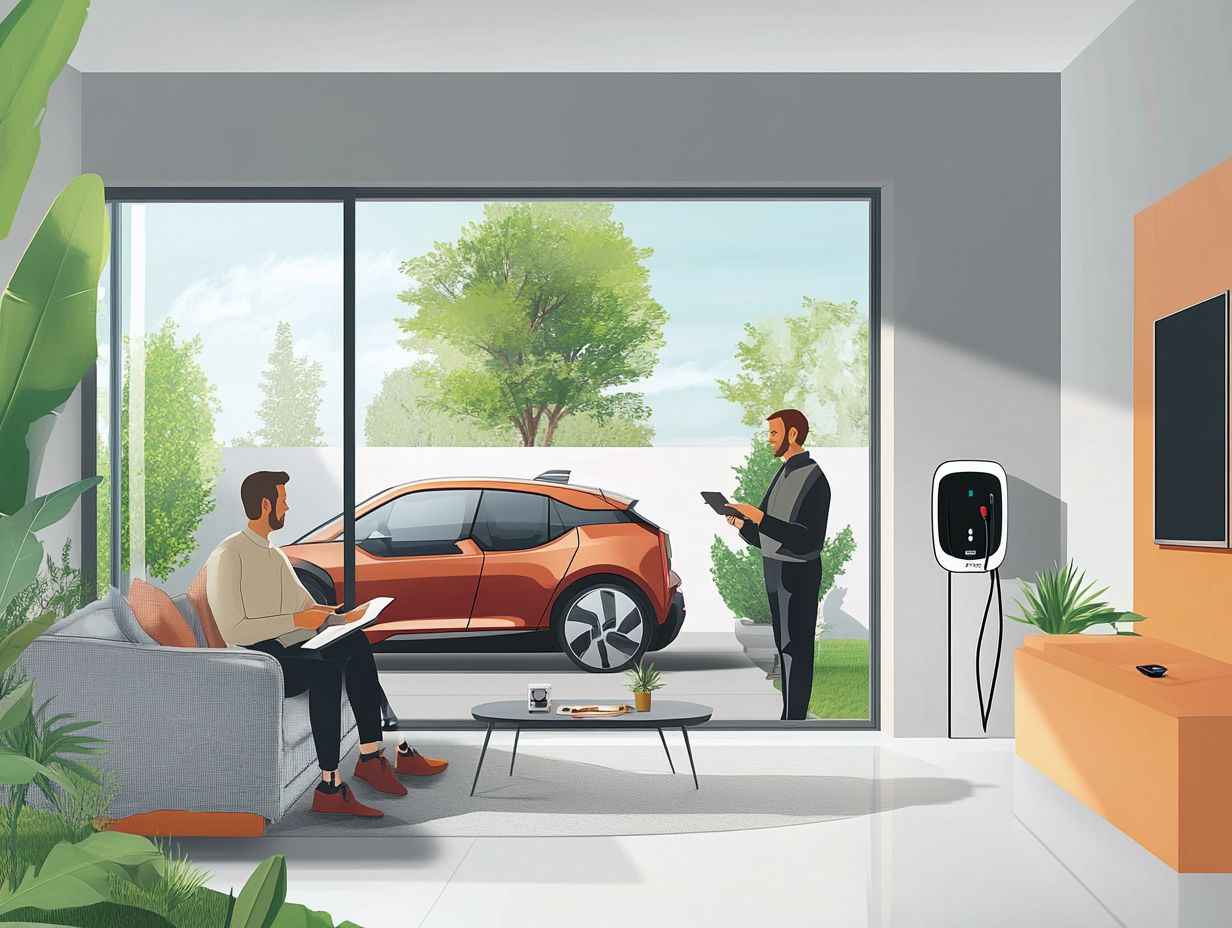
Integrating smart home technology into your energy management strategy can significantly boost the efficiency of charging your electric vehicle while optimizing your overall home energy usage. With smart thermostats and energy management systems tools that help you track and control how much energy you use at your disposal, you can monitor and control your energy consumption more effectively than ever.
By leveraging tools like smart plugs, energy monitoring apps, and home automation systems, you can gain valuable insights into your energy consumption patterns throughout the day. These technologies provide real-time data tracking, enabling you to identify peak usage times when electricity costs may spike.
Your smart devices can optimize EV charging during off-peak hours, helping you save on energy bills while promoting greater sustainability. This approach not only fosters cost savings but also aligns with a more environmentally conscious lifestyle.
Future Implications and Solutions
The shift towards electric vehicles is exciting for your energy consumption and the electric grid. It’s essential to embrace the changes and explore the opportunities that come with them.
Impact on Grid and Renewable Energy Integration
As you embrace the rise of electric vehicles, you ll notice their impact on the electric grid becoming ever more significant. This shift calls for the integration of renewable energy sources to meet the increasing demands of energy consumption. Adapting your charging infrastructure is vital for fostering sustainable growth in the electric vehicle sector.
With electric vehicles gaining momentum, you’re part of a transformative change in energy consumption patterns, particularly during peak hours. To handle this surge, you’ll need a robust strategy that incorporates solar, wind, and other renewable resources, ensuring a cleaner energy supply for all.
By leveraging innovations in grid management, such as smart grids, you can optimize energy distribution and reduce stress on traditional systems. Expanding charging infrastructure especially fast-charging stations will ease the integration of electric vehicles into your daily life, paving the way for a smoother transition to a more sustainable transportation ecosystem.
Frequently Asked Questions
What is the impact of EV charging on home energy use?
The impact of EV charging on home energy use refers to the amount of electricity consumed by an electric vehicle (EV) while charging at home and how it affects the overall energy usage of a household. To learn more about this topic, check out understanding the environmental impact of EV charging.
Does charging an EV at home increase my energy bill?
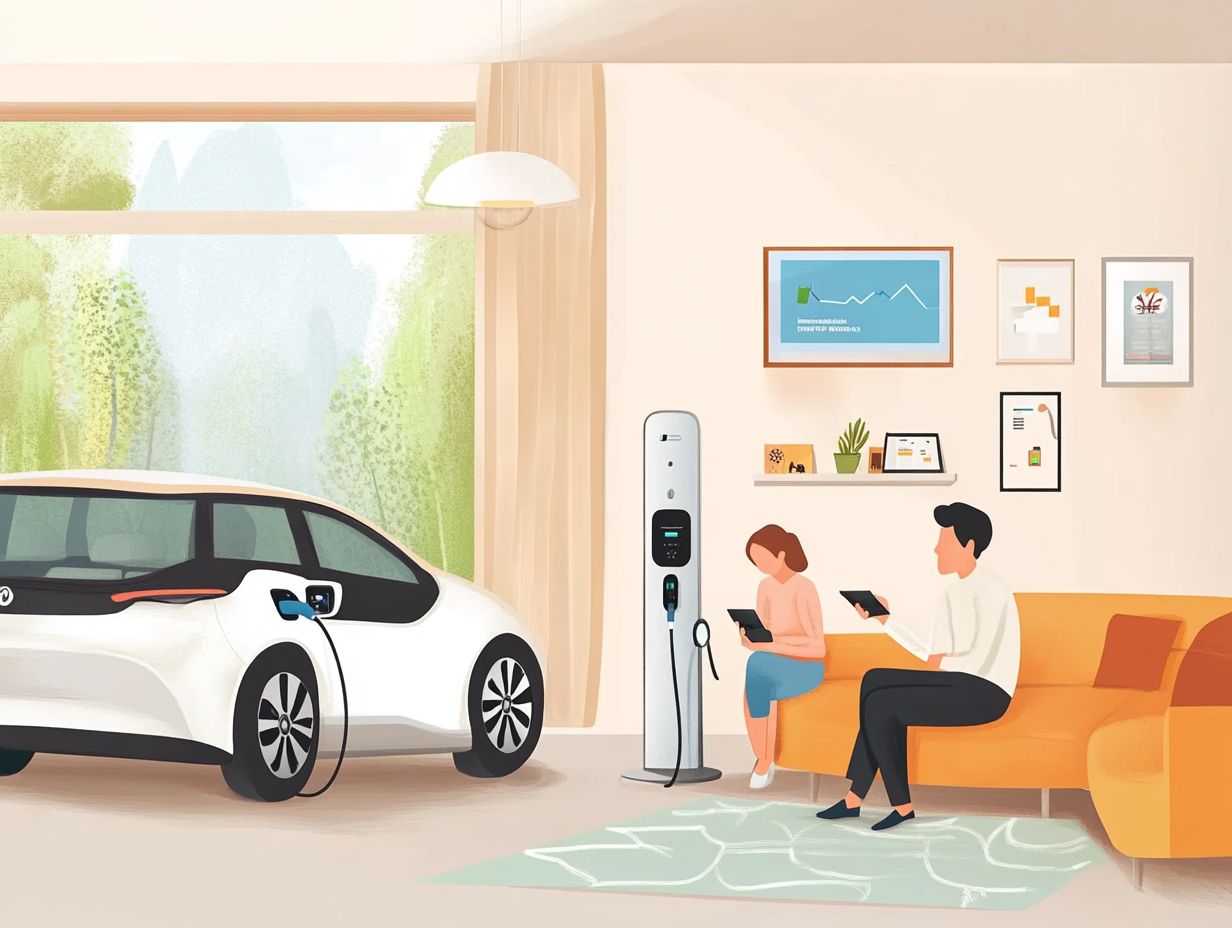
Yes, charging an EV at home will increase your energy bill as it requires a significant amount of electricity. However, the cost of charging an EV is still lower compared to the cost of fueling a traditional gasoline car.
Can I charge my EV at home using solar panels?
Yes, you can charge your EV at home using solar panels. This is known as solar EV charging, and it can help reduce your overall energy costs and carbon footprint.
What are the benefits of charging an EV at home?
- Convenience: Plug in your vehicle overnight and have it fully charged by morning.
- Cost Savings: Take advantage of cheaper electricity rates during off-peak hours.
How does EV charging impact the environment?
EV charging can have a positive impact on the environment by reducing emissions and dependence on fossil fuels. However, the production of electricity used for charging can also have negative environmental effects depending on the source of the electricity.
Is it safe to charge my EV at home?
Yes, it is safe to charge your EV at home as long as you follow the manufacturer’s instructions and use proper equipment. It is recommended to have a licensed electrician install a dedicated EV charging outlet to ensure safety.
Explore more about how you can enhance your home with smart technology today!

